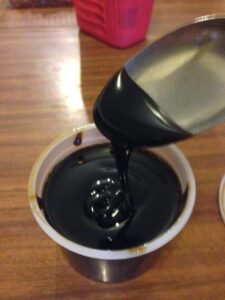Our first Reader Feature of 2015 is a person whose name
you should recognize – Mike Minassian, from Cordoba, Argentina.
After a hiatus of several months, Mike has
resumed his search for the perfect lahmajoun dough recipe.
Here’s what Mike has to say on this subject:
“I’m happy to announce I’m back on the road with the ‘Perfect
Lahmajoun Dough Experiment’ – # 3.
For my girlfriend’s birthday I
offered to prepare a meal for her and her family. I saw an opportunity to cook
lahmajoun once again! I actually prepared a whole Armenian meal including
Sarma, Kufthe meatballs, madzoon, hummus, baba-ganoush and of course Lahmajoun!
I think I’m getting closer. This time I used a variation
of #4 dough recipe you sent me (see recipe below) a while ago.
I used self-rising
flour (it works great and it costs the same than the regular flour) about 700
grams (approximately 3 cups), 1 cup lukewarm whole milk, 3 tbsp. milk cream,
olive oil, 1 tsp salt, and (this is something new) 1 tbsp. malt extract. Now I
used malt extract because I know it is used in baking to preserve moisture in
the products.   |
| Malt Extract |
  |
| Lahmajoun dough |
In the last experiment my lahmajoun dough was flexible enough but still when I
rolled it up to eat, you could see some cracks in the sides, meaning that some
moisture control needed to be done.
I used same topping as the previous (experiment).
Topping recipe:
I used 500 gr. (a bit more than 1 lb.) ground beef, 2
onions and 2 tomatoes finely chopped, actually I rather like to process them.
Some parsley also chopped. Also added 1/4 of a roasted red bell pepper (I made
this some weeks ago). At this point I should mention that the Armenians
here in Argentina, at least in Cordoba, use tomatoes for the topping instead of
peppers, though I like to add some to my recipe. The spices I used include
salt, paprika, ground chili, tricolor pepper, chemen (or fenugreek), and hot
chili powder. I mixed everything with my hands, and then processed all. I do
this because I like the topping to stick together after I cook it. For this I
also add a tbsp. of white vinegar (or apple cider vinegar). After everything is
processed I added the juice of one lemon and let it stand for an hour in the
fridge. This amount of topping is enough for making a bit more than 2 dozens,
so I just used half of it this time, and saved the rest for next time.
  |
| Stacked Lahmajoun |
After I took the
(lahmajoun) out of the (very hot) oven, as usual I (stacked) them one on
another. Instead of covering the pile with a kitchen (towel), this time
I (covered them) with a plastic bag. Why? Well, I wanted to preserve
moisture, and with the (towel) I couldn’t achieve that because of the porosity
of the (towel).
The result: A very tender and flexible dough. I could roll it
and, see, no cracks at all! I really don’t know if this is the way the elderly
woman I told you about makes them, but they are close enough. I will continue
with this recipe and with time improve it.”
  |
| Lahmajoun Dough Experiment #3 Final Product |
Mike’s final thoughts on the perfect lahmajoun dough
recipe:
I don’t know if this last recipe is the way the woman I
told you at the beginning does it, but I think it’s pretty close and for now
I’m satisfied with it. So yes, this would be “perfect” enough. I’m
sure with time and practice I will refine even more the art of making lahmajoun,
so I’ll keep sending you improvements eventually.
Here is the recipe Mike modified for this dough experiment.
Dough recipe #4: This recipe is from the cookbook,
’Armenian Cuisine – Preserving Our Heritage’ – St. John’s Armenian Church
cookbook, in Michigan
This recipe differs in that it uses whole milk, canned
evaporated milk in addition to vegetable shortening. This makes 80 to 90
lahmajouns!
Ingredients:
3 packages (or 7 teaspoons) active dry yeast
2 cups lukewarm water (about 105°F to 110° F)
1 ½ Tablespoon sugar
12 ounce can evaporated milk
2 cups whole milk
1 cup water
1 ½ cups shortening, melted
½ teaspoon salt
5 pounds flour, for medium-soft dough
Directions:
1. In a 4-cup measuring cup, add the yeast, 2 cups warm
water and sugar. Stir to dissolve well. Set aside and allow to activate
(proof).
2. In a large bowl, or bowl of a stand mixer, combine the
evaporated milk, whole milk, 1 cup water, melted shortening and salt.
3. Begin adding flour and the proofed yeast to the liquid
ingredients. Mix well. Continue to add flour until you have a medium-soft
dough. Place dough on a floured work surface and knead until smooth and
elastic.
4. Place dough in a clean bowl, and cover with plastic
wrap or kitchen towel until double in size. Dough should be soft.
5. Punch down dough and form into 2 ounce balls. Keep
balls covered in plastic wrap. Roll out each ball into a circle.

